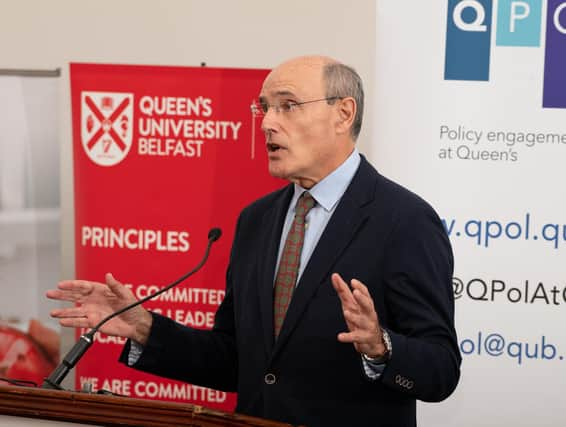Lack of political will to reform healthcare is at heart of crisis


This is all happening within a political vacuum.It would be easy to blame all of the woes on inadequate health funding. Clearly, more money for whichever government department you care to choose would improve their service delivery.The Department of Health here already absorbs more than half of the £14bn budget annually and after the Covid pandemic and amid a global economic downturn, departments will be asked to work within tighter, rather than more generous, budgets.While the doctors, nurses, surgeons, porters and all within the vast umbrella of our National Health Service work tirelessly to treat patients as well as possible, it has been clear for years that the system is under incredible pressure.Changes to how the system is structured is the most viable way to achieve a more robust system. Experts have been saying this for two decades.The department has commissioned reviews into NI’s health service, but few of the recommendations have been brought forward. In 2001 there was the Maurice Hayes review; in 2011 the Compton Report; and in 2014 was the Donaldson Report. Then, in his 2016 review, Professor Raphael Bengoa said that Northern Ireland faced a stark choice: “It can either resist change and see services deteriorate to the point of collapse over time, or embrace transformation and work to create a modern sustainable service.”The deterioration he spoke of certainly seems to have advanced.Emergency departments often bear the brunt of the health pressures, because people have been unable to get treatment elsewhere. It is the one medical service that never closes – unless, as at Antrim Area hospital, they become so overwhelmed it is no longer safe to remain open.If some of these patients can be treated at their GPs, then we should be trying to facilitate that. If some GP patients could be treated just as well by a community pharmacy then we should direct them there.Of course in genuine emergencies the emergency department is the only place to receive treatment. In others, we should direct patients to other services.The Phone First scheme aimed to do this by assessing patients’ need prior to their attendance at hospital. However, if people lack confidence that they will be seen in a timely fashion elsewhere they may choose to attend emergency departments regardless.We must look at the crisis in emergency and other NHS departments more widely.Domiciliary care improvements is an area that could enhance hospitals’ capacity to treat patients. If appropriate care packages were available for everyone who needs them, then we would see hospital beds freed up sooner. Instead, patients are spending much more time in hospital than they would like to, because the care system isn’t able to provide the at-home help required.An alternative – costly for the department and disruptive for patients – was recently adopted whereby patients able to be discharged but without an appropriate care package were offered paid-for places in residential homes. The cost of this to the department was far in excess of that which would have been needed to provide the home care these patients wanted and deserved.Rather than make needed large-scale changes we engage in expensive fire fighting.Another significant cost is agency work – using nurses, consultants and other professionals who work via agencies when adequate numbers of salaried staff employed directly by the health service cannot be found. The cost per hour for agency staff can be several times that of a directly-employed staff member and many experienced workers are choosing not to sign contracts but to work via agencies. Without enough salaried nurses and doctors on the books, the system is at the mercy of the agencies.Amid these health worker strikes, it is worth noting that if pay and conditions for nurses don’t improve then there is little incentive to move from being an agency worker to directly employed.Recent GP closures – as well as 16 identified as being 'at-risk' – have come at the worst possible time for patients, but again reflect the pressures on GPs.I have asked ministerial assembly questions on each of the above issues. The Department of Health, and the ministers in charge, have not always been without blame for mistakes made, but when the structures in place are becoming more unworkable then long-term solutions will be hard to come by.Large-scale reform is needed, using the various reports as guidance.Specialist hubs that can treat particular conditions expertly are needed, as are regional centres that provide comprehensive care from modern sites; and local facilities that can provide emergency care.Some have expressed concern about increased travel times to the proposed specialist centres, but if the new system provides much better care for things like cancer and heart disease and cut waiting times from years to months then I think the choice is clear.The current system is likely – as Professor Bengoa said – to continue to deteriorate to the point of collapse. We can’t wait until this happens.There is a reason why these changes have not been made before, and that reason is politics. We have had review after review but nothing of substance is done because of a lack of political will. This must change.Unfortunately, Northern Ireland is again without a functioning government and without a locally agreed budget. There is a vacuum where our elected representatives should be negotiating and finding answers.